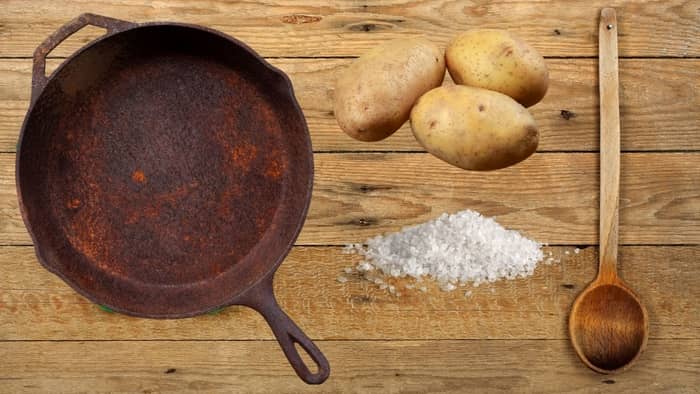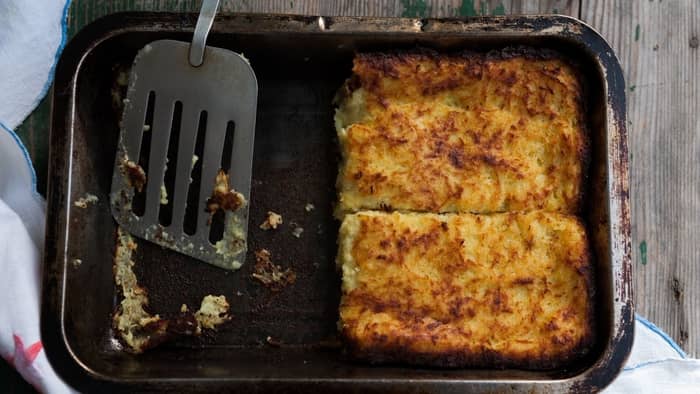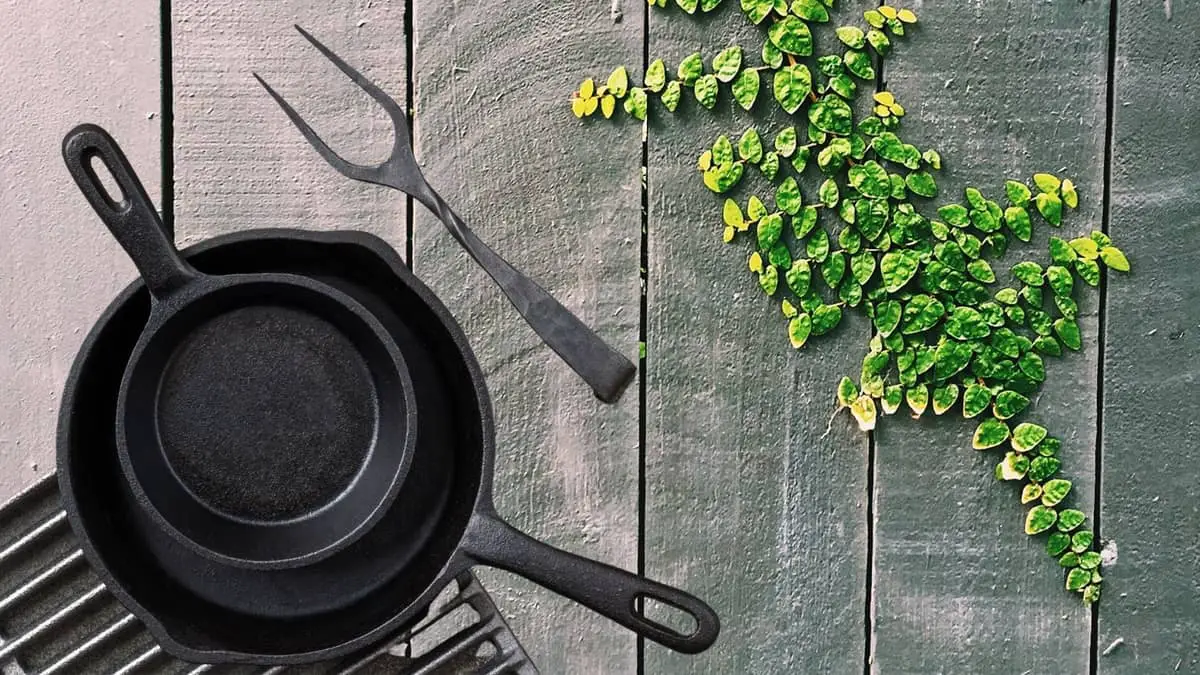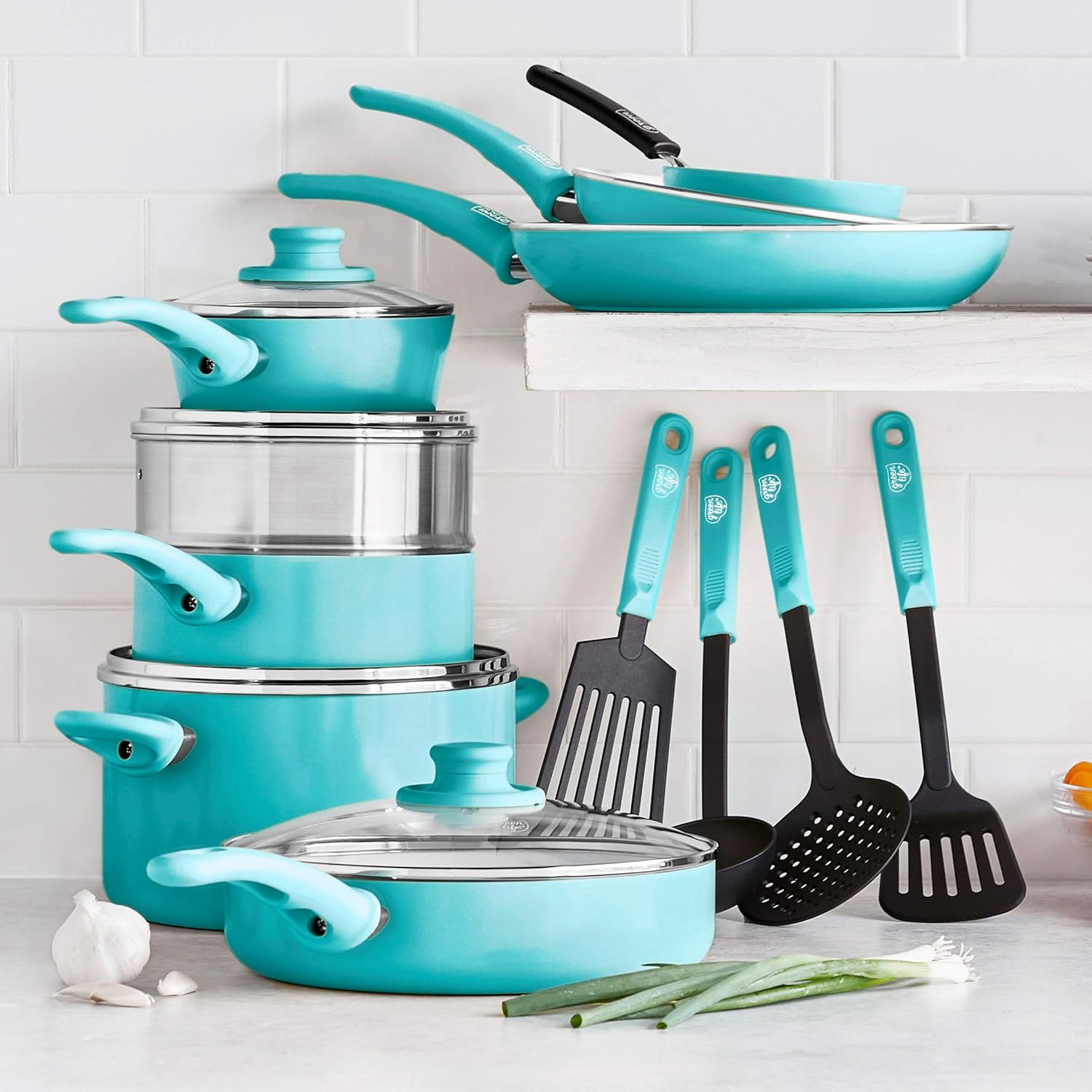Last Updated on March 12, 2022
Have you been wondering how to get rust off pans? If you spend most of your days cooking in your kitchen, you may have noticed that some of your cooking stuff can become rusty. And it worries you to see those orange blemishes appearing in your cookware, especially your pans.
How To Get Rust Off Pans?
You might ask yourself if it is possible to eliminate the rust accumulating in your pans. Well, you sure can. To get the rust off your pans, you will need a potato, Kosher salt, a kitchen towel, and a newspaper.
Next, lay your newspaper in your working area to avoid making a mess. Then, cut your potato crosswise in half and coat the bottom of your pan generously with kosher salt. After that, hold your potato with the cut side facing the surface of your pan and scrub the rusted parts.
Afterward, be sure to apply pressure when you scrub, and if you feel that your potato starts to become slick, cut off the side facing the surface and wash some more.
Then, make sure to rinse your pan and add more salt granules if your salt becomes too dirty. Finally, when you have removed all the rust from your pan, rinse it with water and pat it dry using a kitchen towel.

Moreover, is it safe to use a rusty baking pan? If you have had your baking pan for like forever, it may have shown signs of wear and tear. Not only that, but also it is developing rust; keep in mind that rust can develop in old cookware like baking pans when used frequently. And on this note, it is essential to think about the potential health risks of using rusty baking pans.
Also, when people think about rust-related health risks, Tetanus is the first thing that pops to mind. Tetanus is a nervous system infection caused by bacteria that mostly accumulate on rusty metals left outside and exposed to elements.
That is why, if you keep your baking pans inside, it is unlikely to have the bacteria that causes Tetanus. Nonetheless, cooking with rusty baking pans is not 100 percent safe.
A person sensitive to rust will have health complications when they ingest even a tiny amount of rust. Aside from the potential health risk from using rusty baking pans, the rust can adversely affect the flavor of your food. Because of that, rusty baking pans are not a good idea and are not safe. As most people say, it is better safe than sorry.
Removing rust from a non-stick pan
How do you remove rust from a non-stick pan? Remember, nonstick pans are investments because it does not require oil. Though, are you taking good care of your nonstick pans at home and giving them the extra tender love and care that they need to withstand time?
GreenLife Soft Grip Healthy Ceramic Nonstick 16 Piece Cookware Pots and Pans Set
For the most part, treating your nonstick pans with care like hand washing and hand drying after every use can make your pans clean and free of rust and residues.
Unfortunately, if your nonstick pans have rust, you cannot use the standard methods to remove the rust from other pans like cast iron. It is better to check with your pan’s manufacturer to ask if they could recommend a remedy.
However, have you heard the phrase, prevention is better than cure? It is better to prevent rust from your non-stick pans at home. Here are a few ways to ensure that your nonstick pans will be clean and rust-free.
First, wash your pan by hand after every use with mild soap and a soft sponge and rinse it with lukewarm water. Next, soak your pan in warm soapy water for about ten to twenty minutes before washing it by hand to remove the bacteria and break up the grease and residues.
But, if stubborn gunk is present, scrub it with baking soda paste and use equal baking soda and water parts to make the paste. Then, be sure to dip a sponge into the paste and dab it gently in the pan’s sides, including the interior.
Afterward, let the soda paste sit for about fifteen minutes and rinse the pan thoroughly. Lastly, dry your pan by hand after washing. Also, never put your pan away when wet. This step is crucial to prevent rusting. With that, make sure to use paper towels or soft dish rags.
Using vinegar to remove rust
Before anything else, does vinegar remove rust? In essence, vinegar is a liquid produced through the fermentation of ethanol into acetic acid. It is primarily a diluted solution of acetic acid and water. But, it contains a few enzymes, vitamins, minerals, and other organic compounds.
So, if you wonder if vinegar can remove rust, the answer is an absolute yes. It may be unusual to use everyday items differently, but sometimes it can be cost-effective and always available.
Additionally, every pantry has a vinegar bottle, but you commonly utilize it to flavor your dishes; consider that vinegar is cheap. Likewise, it is a natural solution that effectively removes rust.
Most of the time, the vinegar strips off the layer of the rust from iron objects because it contains acetic acid that reacts with rust to form salt and water. This process is also called the neutralization process. It is when metal oxide and acid react. After that, it produces salt and water.
In that regard, when you submerge a rusted object in vinegar, the rust or iron oxide reacts with the vinegar’s acetic acid, thus forming salt and water.

Reasons Why Baking Trays Rust
Why do my baking trays go rusty? Please note that baking trays are typically aluminum, stainless steel, cast iron, and Teflon; these materials contain iron or steel. Considering that baking trays are metal, they are susceptible to rust through prolonged exposure to moisture.
So, the main question is, why are your baking trays getting rusty? The answer is that when these metals react with oxygen and water, rust forms.
Rust is also well known as hydrated iron oxide. When you are constantly using your baking trays, it frequently comes in contact with water, and when you store your wet or dampened baking trays without drying them off thoroughly, that is when rust usually occurs.
Remember that the rust can spread quickly and can generate severe damage to your baking trays and pans, including pots, if not appropriately managed.
To prevent having rusty baking trays, ensure that your trays are completely dry before putting them away. Also, make sure to place your baking trays in a cool, dry, and dark place because the heat and humidity can encourage the formation of rust. Likewise, applying a rust-proof coating to your baking trays is also helpful if used occasionally.
FAQs
Is It Safe To Use A Rusty Baking Pan?
No, the reason is that some individuals who are sensitive to rust will undoubtedly have health complications when they ingest a tiny amount of it. That is why there is no denying that utilizing rusty baking pans is a terrible idea.
How Do You Remove Rust From A Non Stick Pan?
In most cases, you cannot utilize the standard techniques in removing your nonstick pan's rust. For this reason, it would be best to check with your nonstick pan manufacturer to ask if they could suggest a remedy. Nevertheless, it is best to prevent rust in the first place by hand washing and hand drying after every use.
Does Vinegar Remove Rust?
Yes, it can indeed remove rust. Even better is that it is convenient since most pantries have a vinegar bottle, not to mention that it is cost-effective. Nevertheless, it is a natural solution that removes rust effectively.
Why Do My Baking Trays Go Rusty?
Typically, metals react with water and oxygen; and because of that, rust develops. For that reason, it is not best to store them whenever they are still wet right away; always make sure to dry them off thoroughly.

Zarah is an experienced pastry chef whose creations have delighted countless customers. With a passion for baking, Zarah has developed a unique style that combines classic techniques with modern flavors. Her desserts are consistently crafted with the finest ingredients, and her attention to detail is evident in the stunning and delectable results. Zarah has a wealth of experience in the pastry kitchen, and loves to share her knowledge with others. Whether it is teaching a class or creating a custom cake for a special occasion, Zarah is committed to making sure every customer is satisfied.


